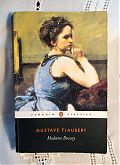
Gustave Flaubert
Madame Bovary
I finished Madame Bovary mid-way across the black Atlantic. Alit, the flying machine flew through lonely space, as I turned those last tragic pages. The illusion Emma had strove to live for crumbled; Flaubert’s character flaked apart before my eyes. I could almost see Flaubert crying, whether for her or the words he had finished laying to paper. What a book! What a writer!
She loved the sea only for the sake of tempests, the meadow only as a background for some ruined pile. From everything she had to extract some kind of personal profit; and she discarded as useless anything that did not lend itself to her heart’s immediate satisfaction—endowed with a temperament more sentimental than artistic, preferring emotions rather than landscapes.
Emma Bovary. The mascot for all unhappy and unfulfilled women from the day the novel was published. She sits alone at her window, watching, and waiting, for something to happen, for life to come up like a wave and finally embrace her. She cannot go seeking for herself. Where would she go in the world of men? She is a luxury, an article, like the stuff she fills her house with; evanescent and vaporous, like the romantic dreams of passion she fills her head with.
From where came her romantic notions? Books, romances, Flaubert tells us, were Emma’s fuel for fantasy as chivalric novels were to Don Quixote. Dreams composed similar to stories read, what her life could be: stories of true love and heated passion, of riches and easy luxuries. But instead, Emma married Charles. Poor average Charles, the town doctor, who was devoted to her like a queen though she never loved him, and even in the beginning barely thought she did. Books gave color to the drab, usual shabbiness that surrounded her, enhanced her life meaningfully.
And who can blame her? Even as she raced on towards her ruin, I couldn’t blame her for trying. There were times when Emma was lifted up, was brought closer to love’s ideal which she held so near to her beating heart. And people admired her, men and women, how she set herself apart from life’s unmistakable monotony. But Madame Bovary is a tragedy; and our dreams usually reach further than reality. Always being on illusion’s side makes for a pretty hard landing.
Many references are made concerning Flaubert’s autobiographical relationship to his character Madame Bovary, to her imagination, and knowledge of the world which always appeared two steps away from it. Writers are idealists and Emma Bovary was a great one. But what conclusions can be drawn? For then we have Homais, another incorrigible idealist, who flourishes; and Flaubert himself, whose painstakingly perfect prose has remained vital and alive even now in our history. Where are the dreamers among us? How quickly they are trampled.
That Emma’s life was not boring or dull or lifeless like Charles’ was, but exciting, and nerving, and sensual; that though her dreams were self-defeating, in whatever way she could, she pursued them. I would like to think that was enough because I am an optimist and an idealist. Because, tho emptiness is never far from fulfillment and chills part of the fever, I am of the opinion that we must live ourselves out to the end in defiance of mediocrity. Like Emma Bovary.
· · · · · · · · · · · · · · · · · · · ·